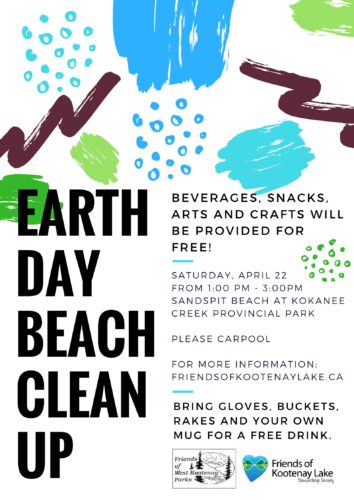Earth Day Beach Cleanup at Kokanee Creek Park
Celebrate Earth Day Saturday, April 22 with the Friends of West Kootenay Parks and the Friends of Kootenay Lake Stewardship Society and help clean up Sandspit Beach at Kokanee Creek Provincial Park from 1:00pm to 3:00pm. If you have them, bring gloves, buckets, and rakes. There will be beverages, snacks, arts and crafts for the kids and prize draws for everyone! Please try to carpool to this Earth Day event.
Some of the material we’ll be picking up will be regular trash from packaging. However, in recent years there has been an alarming increase of polystyrene (StyrofoamTM) on Kootenay Lake beaches. The majority of this comes from old dock floats which, when unprotected by a hard plastic encasement, are broken down to small blue and white pieces which get washed up on shore. The StyrofoamTM then gets mixed into the sand and organic material with the wind and waves.
While there is a lack of scientific studies on polystyrene impacts on freshwater ecosystems, marine studies show that many animals, especially young fish, mistake the plastic for food. After ingesting it, they exhibit a loss of appetite, toxic poisoning, and starvation. One can assume that freshwater fish such as trout and kokanee also eat the small pieces. Ducks have been observed pecking and eating the StyrofoamTM dock blocks.
Polystyrene, made from petrochemicals, was first manufactured in the 1970’s and now has thousands of uses. It is water resistant and very lightweight when made into foam. Non-biodegradable, StyrofoamTM lasts for hundreds of years, and is not easily recycled. Being 95% gas, it floats very well and is promoted as an excellent, cheap material for docks. Buoyancy billets can be blue extruded polystyrene foam (XPF) or compressed white spheres molded into blocks. Newer docks use rigid plastic boxes which keep the StyrofoamTM from getting into the environment.
Cleaning up our beaches will not only improve their appearance, but keep plastic pollution from harming the fish and wildlife.
RSVP here
